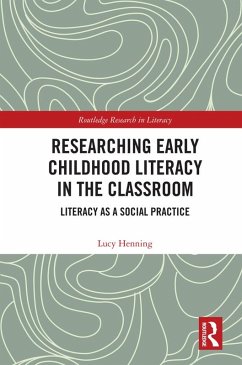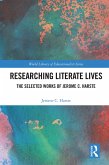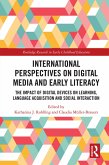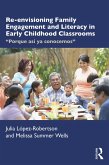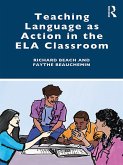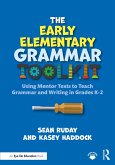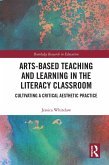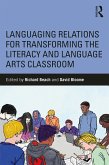Lucy Henning
Researching Early Childhood Literacy in the Classroom (eBook, PDF)
Literacy as a Social Practice
40,95 €
40,95 €
inkl. MwSt.
Sofort per Download lieferbar

20 °P sammeln
40,95 €
Als Download kaufen

40,95 €
inkl. MwSt.
Sofort per Download lieferbar

20 °P sammeln
Jetzt verschenken
Alle Infos zum eBook verschenken
40,95 €
inkl. MwSt.
Sofort per Download lieferbar
Alle Infos zum eBook verschenken

20 °P sammeln
Lucy Henning
Researching Early Childhood Literacy in the Classroom (eBook, PDF)
Literacy as a Social Practice
- Format: PDF
- Merkliste
- Auf die Merkliste
- Bewerten Bewerten
- Teilen
- Produkt teilen
- Produkterinnerung
- Produkterinnerung

Bitte loggen Sie sich zunächst in Ihr Kundenkonto ein oder registrieren Sie sich bei
bücher.de, um das eBook-Abo tolino select nutzen zu können.
Hier können Sie sich einloggen
Hier können Sie sich einloggen
Sie sind bereits eingeloggt. Klicken Sie auf 2. tolino select Abo, um fortzufahren.

Bitte loggen Sie sich zunächst in Ihr Kundenkonto ein oder registrieren Sie sich bei bücher.de, um das eBook-Abo tolino select nutzen zu können.
This volume demonstrates how the ethnographic approach to research demanded by a 'Literacy as Social Practice' perspective can generate fresh insights into what happens when young children engage with schooled literacy tasks.
- Geräte: PC
- ohne Kopierschutz
- eBook Hilfe
- Größe: 2.93MB
Andere Kunden interessierten sich auch für
![Researching Literate Lives (eBook, PDF) Researching Literate Lives (eBook, PDF)]() Jerome C. HarsteResearching Literate Lives (eBook, PDF)40,95 €
Jerome C. HarsteResearching Literate Lives (eBook, PDF)40,95 €![International Perspectives on Digital Media and Early Literacy (eBook, PDF) International Perspectives on Digital Media and Early Literacy (eBook, PDF)]() International Perspectives on Digital Media and Early Literacy (eBook, PDF)40,95 €
International Perspectives on Digital Media and Early Literacy (eBook, PDF)40,95 €![Re-envisioning Family Engagement and Literacy in Early Childhood Classrooms (eBook, PDF) Re-envisioning Family Engagement and Literacy in Early Childhood Classrooms (eBook, PDF)]() Julia López-RobertsonRe-envisioning Family Engagement and Literacy in Early Childhood Classrooms (eBook, PDF)40,95 €
Julia López-RobertsonRe-envisioning Family Engagement and Literacy in Early Childhood Classrooms (eBook, PDF)40,95 €![Teaching Language as Action in the ELA Classroom (eBook, PDF) Teaching Language as Action in the ELA Classroom (eBook, PDF)]() Richard BeachTeaching Language as Action in the ELA Classroom (eBook, PDF)42,95 €
Richard BeachTeaching Language as Action in the ELA Classroom (eBook, PDF)42,95 €![The Early Elementary Grammar Toolkit (eBook, PDF) The Early Elementary Grammar Toolkit (eBook, PDF)]() Sean RudayThe Early Elementary Grammar Toolkit (eBook, PDF)28,95 €
Sean RudayThe Early Elementary Grammar Toolkit (eBook, PDF)28,95 €![Arts-Based Teaching and Learning in the Literacy Classroom (eBook, PDF) Arts-Based Teaching and Learning in the Literacy Classroom (eBook, PDF)]() Jessica WhitelawArts-Based Teaching and Learning in the Literacy Classroom (eBook, PDF)40,95 €
Jessica WhitelawArts-Based Teaching and Learning in the Literacy Classroom (eBook, PDF)40,95 €![Languaging Relations for Transforming the Literacy and Language Arts Classroom (eBook, PDF) Languaging Relations for Transforming the Literacy and Language Arts Classroom (eBook, PDF)]() Languaging Relations for Transforming the Literacy and Language Arts Classroom (eBook, PDF)42,95 €
Languaging Relations for Transforming the Literacy and Language Arts Classroom (eBook, PDF)42,95 €-
-
-
This volume demonstrates how the ethnographic approach to research demanded by a 'Literacy as Social Practice' perspective can generate fresh insights into what happens when young children engage with schooled literacy tasks.
Dieser Download kann aus rechtlichen Gründen nur mit Rechnungsadresse in A, B, BG, CY, CZ, D, DK, EW, E, FIN, F, GR, HR, H, IRL, I, LT, L, LR, M, NL, PL, P, R, S, SLO, SK ausgeliefert werden.
Produktdetails
- Produktdetails
- Verlag: Taylor & Francis
- Seitenzahl: 198
- Erscheinungstermin: 5. November 2019
- Englisch
- ISBN-13: 9780429944734
- Artikelnr.: 58077721
- Verlag: Taylor & Francis
- Seitenzahl: 198
- Erscheinungstermin: 5. November 2019
- Englisch
- ISBN-13: 9780429944734
- Artikelnr.: 58077721
- Herstellerkennzeichnung Die Herstellerinformationen sind derzeit nicht verfügbar.
Lucy Henning is Senior Lecturer in primary English at Roehampton University, UK.
List of Abbreviations
List of transcription conventions
Foreword
ACKNOWLEDGEMENTS
Introduction: Literacy, Schooling and Young Children
PART ONE: FRESH PERSPECTIVES ON FAMILIAR PHENOMENA
Chapter 1 Fresh Perspectives on Familiar Phenomena
* Introduction
* Section 1: Literacy in the social world
* Section 2: Literacy in the institution of schooling
* Section 3: Children's interpretive reproduction of literacy in
schools
* Conclusion
Chapter 2: Researching Young Children's in-school literacy practices
Introduction
* Section 1: Policy priorities for researching early childhood literacy
* Section 2: Ethnographic principles for researching early childhood
literacy in classrooms
* Section 3: Re-examining young children's in-school literacy practices
* Conclusion
PART TWO: AMBER CLASS CHILDREN PRACTISE LITERACY
Chapter 3: Jessica practises literacy with Donna
* Introduction
* Section 1: Normalising expectations for young children's literacy
practices.
* Section 2: Interpretively reproducing literacy practices in the
classroom.
* Section 3: Interpretively Reproducing literacy skills and knowledge
* Conclusion
Chapter 4: The importance of Amber Class' children's in-class peer culture
* Introduction
* Section 1: Producing peer culture literacy in social interaction
* Section 2: Managing peer culture priorities: Peer to peer copying
* Section 3: Managing peer culture and schooled literacy priorities
* Conclusion
Chapter 5 Amber Class Children's encounter with being grouped for teaching
* Introduction
* Section 1: Schooled literacy manages relative literacy expertise
* Section 2: Peer culture interpretations of schooled groupings
* Section 3: Sharing literacy expertise in the peer culture
* Conclusion
PART THREE: DISCUSSION AND CONCLUSIONS
Discussion: Reflecting on young children, schooling and literacy
Conclusion
Appendix: My research project
REFERENCES
List of transcription conventions
Foreword
ACKNOWLEDGEMENTS
Introduction: Literacy, Schooling and Young Children
PART ONE: FRESH PERSPECTIVES ON FAMILIAR PHENOMENA
Chapter 1 Fresh Perspectives on Familiar Phenomena
* Introduction
* Section 1: Literacy in the social world
* Section 2: Literacy in the institution of schooling
* Section 3: Children's interpretive reproduction of literacy in
schools
* Conclusion
Chapter 2: Researching Young Children's in-school literacy practices
Introduction
* Section 1: Policy priorities for researching early childhood literacy
* Section 2: Ethnographic principles for researching early childhood
literacy in classrooms
* Section 3: Re-examining young children's in-school literacy practices
* Conclusion
PART TWO: AMBER CLASS CHILDREN PRACTISE LITERACY
Chapter 3: Jessica practises literacy with Donna
* Introduction
* Section 1: Normalising expectations for young children's literacy
practices.
* Section 2: Interpretively reproducing literacy practices in the
classroom.
* Section 3: Interpretively Reproducing literacy skills and knowledge
* Conclusion
Chapter 4: The importance of Amber Class' children's in-class peer culture
* Introduction
* Section 1: Producing peer culture literacy in social interaction
* Section 2: Managing peer culture priorities: Peer to peer copying
* Section 3: Managing peer culture and schooled literacy priorities
* Conclusion
Chapter 5 Amber Class Children's encounter with being grouped for teaching
* Introduction
* Section 1: Schooled literacy manages relative literacy expertise
* Section 2: Peer culture interpretations of schooled groupings
* Section 3: Sharing literacy expertise in the peer culture
* Conclusion
PART THREE: DISCUSSION AND CONCLUSIONS
Discussion: Reflecting on young children, schooling and literacy
Conclusion
Appendix: My research project
REFERENCES
List of Abbreviations
List of transcription conventions
Foreword
ACKNOWLEDGEMENTS
Introduction: Literacy, Schooling and Young Children
PART ONE: FRESH PERSPECTIVES ON FAMILIAR PHENOMENA
Chapter 1 Fresh Perspectives on Familiar Phenomena
* Introduction
* Section 1: Literacy in the social world
* Section 2: Literacy in the institution of schooling
* Section 3: Children's interpretive reproduction of literacy in
schools
* Conclusion
Chapter 2: Researching Young Children's in-school literacy practices
Introduction
* Section 1: Policy priorities for researching early childhood literacy
* Section 2: Ethnographic principles for researching early childhood
literacy in classrooms
* Section 3: Re-examining young children's in-school literacy practices
* Conclusion
PART TWO: AMBER CLASS CHILDREN PRACTISE LITERACY
Chapter 3: Jessica practises literacy with Donna
* Introduction
* Section 1: Normalising expectations for young children's literacy
practices.
* Section 2: Interpretively reproducing literacy practices in the
classroom.
* Section 3: Interpretively Reproducing literacy skills and knowledge
* Conclusion
Chapter 4: The importance of Amber Class' children's in-class peer culture
* Introduction
* Section 1: Producing peer culture literacy in social interaction
* Section 2: Managing peer culture priorities: Peer to peer copying
* Section 3: Managing peer culture and schooled literacy priorities
* Conclusion
Chapter 5 Amber Class Children's encounter with being grouped for teaching
* Introduction
* Section 1: Schooled literacy manages relative literacy expertise
* Section 2: Peer culture interpretations of schooled groupings
* Section 3: Sharing literacy expertise in the peer culture
* Conclusion
PART THREE: DISCUSSION AND CONCLUSIONS
Discussion: Reflecting on young children, schooling and literacy
Conclusion
Appendix: My research project
REFERENCES
List of transcription conventions
Foreword
ACKNOWLEDGEMENTS
Introduction: Literacy, Schooling and Young Children
PART ONE: FRESH PERSPECTIVES ON FAMILIAR PHENOMENA
Chapter 1 Fresh Perspectives on Familiar Phenomena
* Introduction
* Section 1: Literacy in the social world
* Section 2: Literacy in the institution of schooling
* Section 3: Children's interpretive reproduction of literacy in
schools
* Conclusion
Chapter 2: Researching Young Children's in-school literacy practices
Introduction
* Section 1: Policy priorities for researching early childhood literacy
* Section 2: Ethnographic principles for researching early childhood
literacy in classrooms
* Section 3: Re-examining young children's in-school literacy practices
* Conclusion
PART TWO: AMBER CLASS CHILDREN PRACTISE LITERACY
Chapter 3: Jessica practises literacy with Donna
* Introduction
* Section 1: Normalising expectations for young children's literacy
practices.
* Section 2: Interpretively reproducing literacy practices in the
classroom.
* Section 3: Interpretively Reproducing literacy skills and knowledge
* Conclusion
Chapter 4: The importance of Amber Class' children's in-class peer culture
* Introduction
* Section 1: Producing peer culture literacy in social interaction
* Section 2: Managing peer culture priorities: Peer to peer copying
* Section 3: Managing peer culture and schooled literacy priorities
* Conclusion
Chapter 5 Amber Class Children's encounter with being grouped for teaching
* Introduction
* Section 1: Schooled literacy manages relative literacy expertise
* Section 2: Peer culture interpretations of schooled groupings
* Section 3: Sharing literacy expertise in the peer culture
* Conclusion
PART THREE: DISCUSSION AND CONCLUSIONS
Discussion: Reflecting on young children, schooling and literacy
Conclusion
Appendix: My research project
REFERENCES
